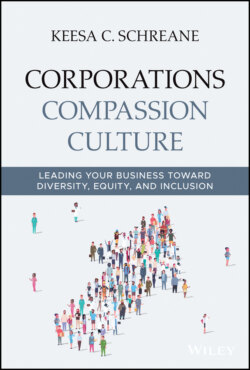Читать книгу Corporations Compassion Culture - Keesa C. Schreane - Страница 20
Today's World
ОглавлениеThe business world has changed in a thousand ways since Carnegie's day. To take just one example, Carnegie and Frick never had to deal with the 24-hour news cycle, Twitter, or the accelerated rate of social change that we have today. Old-school corporate culture likewise needs to do better in keeping up with the swift pace of the social media dominated landscape. Too many leaders are failing to prepare for how much more swiftly movements progress today than they did in past generations.
Social media pervasiveness; a global consciousness of equality, fairness, and inclusion; and greater financial power enable today's movements to be stronger and last longer. These issues affect the company's reputation and bottom line.
The 2019 Uber wage strikes provided a clear example of these forces in action. In addition to concerns about wages, Uber drivers were also concerned about gender bias, sexual harassment, and allegations of a toxic corporate culture.26 The May 2019 strikes had a massive impact on Uber's share prices; the company's $45 IPO price had dropped to $25.58 by November. This compounded other investor concerns, such as the viability of its UberEats venture.27 Then the COVID-19 pandemic hit, and share prices tumbled further, down to $14.82 on March 18, 2020. Uber's stock price held steady in the following weeks of spring and early summer in the $20 to $30 plus range, but they have yet to return to that original IPO high.
In the banking sector, Wells Fargo's leadership appeared to be similarly caught off guard when their corporate culture came under fire in the early 2000s. Employees claimed that nearly impossible sales goals of sometimes up to 20 products a day resulted in a toxic and stressful environment. From 2006 to 2015, the bank's stock rose 67%. But, it turned out that the rise in stock price had been partly due to a number of unethical sales practices, such as the creation of 2 million fake accounts. Ultimately, Wells Fargo eliminated sales goals from its retail side, and the company was faced with a $185 million settlement.28
During 2016, Wells Fargo stock hit a $45 low, but just as bad was the impact on the bank's reputation—this was especially damaging given the era—post-2008 financial crisis, when big banks were vilified and viewed with skepticism.29 Their share price continued to struggle over the four-year period after 2016, peaking over $60, but never getting much higher.30 These examples are cautionary tales. The old corporate culture of putting revenue generation above all else does not always work. This culture is steadily changing. Leaders need to quickly understand how they can balance running a profitable business, while treating employees inclusively, equitably, and compassionately.
